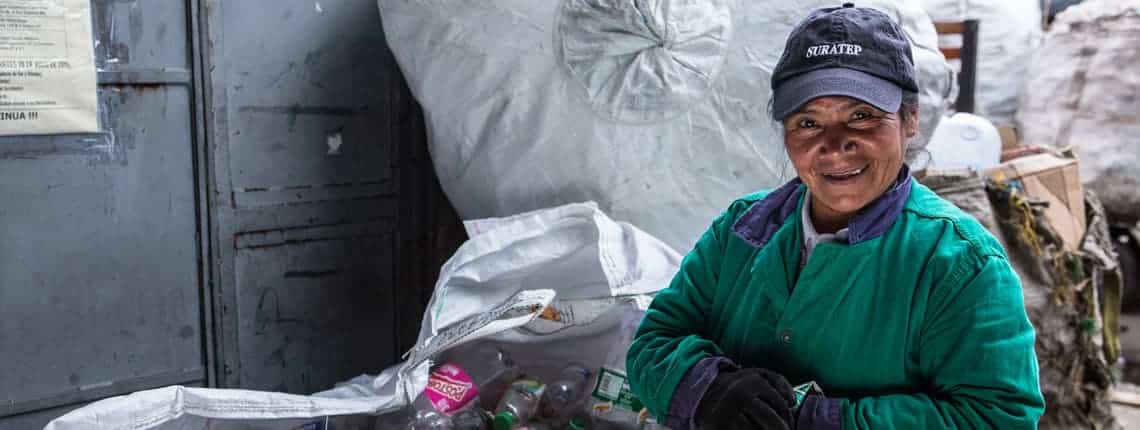Without waste pickers, cities across Africa, Asia and Latin America would be buried in their own garbage. Informal recyclers have proven essential to keeping cities clean, but they’ve struggled to gain recognition by municipalities that often disregard their labour and the importance of their work.
That is why the achievements of waste pickers in Bogotá, led by the Association of Waste Pickers of Bogotá (ARB), have been so globally pioneering.
Informal recyclers have proven essential to keeping cities clean, but they’ve struggled to gain recognition by municipalities that often disregard the importance of their work.
In 2013, ARB won a hard-fought battle for inclusion, gaining recognition and remuneration for waste collection, transport, and public recycling services by the Constitutional Court of Colombia. This feat was achieved after two decades of legal claims that ARB filed to demand their rights, which resulted in seven rulings by the Constitutional Court of Colombia in favour of waste pickers — a major win.
Bogota’s payment system became one of the first of its kind, and since then, other cities in Colombia have followed suit, including Pereira in March 2019.
Today, however, the system of waste-picker integration and recycling has been weakened and is under threat by these new measures.
Today, however, Colombia’s progress at being a global model is under threat.
Despite the fact that there are clear and inclusive laws in the country, waste pickers have faced major setbacks. Since last year, new public policies — both at the local and national levels — have affected previously achieved successes.
Municipal Garbage Containers Appear without Warning
For starters, on the district level, Bogotá’s officials have ordered the installation of 5,000 garbage containers across the city. There are plans to double the amount. The bins have been placed without educating the public on how to use them. As a result, they are overflowing and trash is again littering the streets — an issue waste pickers have worked hard to keep from happening. In addition, the municipal trucks are not properly equipped to pick up the bins, causing increased trash problems.
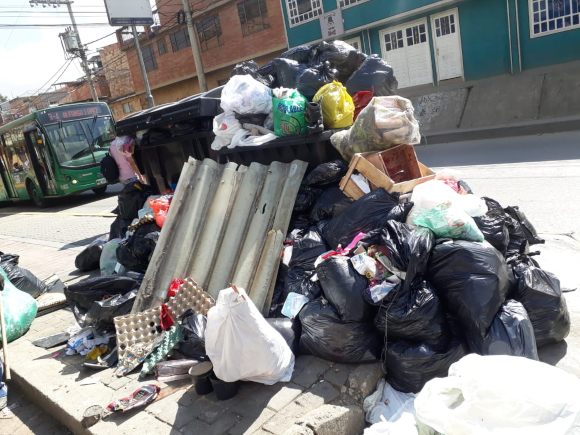
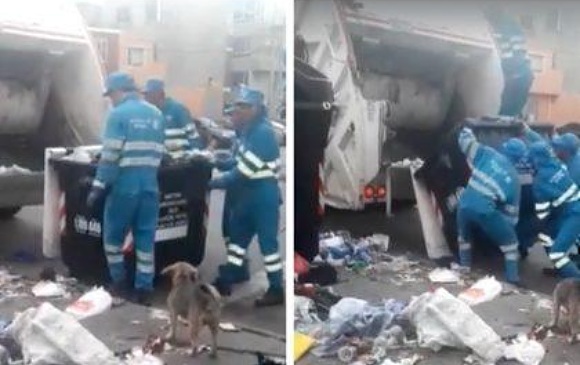
It’s also important to note that the new containers were put in place without any consultation with waste pickers, who rely on disposed materials for their economic survival. The city knows this all too well, and is also aware of the laws that protect waste pickers and their access to waste.
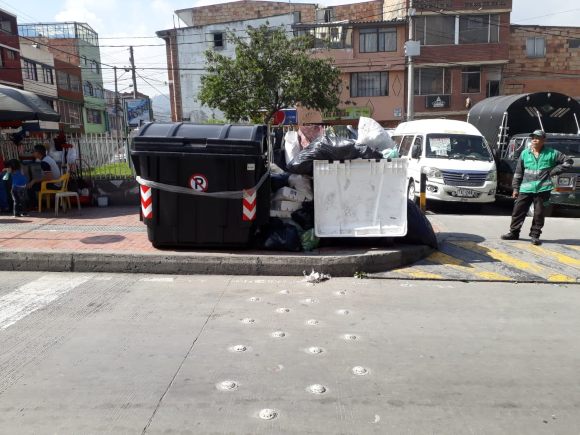
However, the city has gone ahead with its plans anyway, and waste pickers are suffering the consequences.
The bins have been placed without educating the public on how to use them. As a result, they are overflowing and trash is again littering the streets.
For example, of the 5,000 new bins, half were supposed to be for recyclable waste, but given the lack of adequate citizen awareness, the recyclables have ended up mixed with all other waste. Waste pickers have not been able to recover recyclable materials, and their income is being affected, not to mention the environmental impact. At a time when the world is calling for more recycling to prevent an increasing ocean plastic waste crisis, Bogotá’s regressive measures are only making matters worse.
Government “Scraps” Scrap
There are also new policies on the national level that are going against the constitutional orders. For example, the government has begun enforcing burdensome requirements on waste picker organizations. New tax policies are charging fees to waste picker organizations in the process of formalization with onerous financial reporting requirements and very high taxes, resulting in small organizations of waste pickers unable to become sustainable.
With scrap no longer recognized as a recyclable material, waste pickers cannot be paid by the municipality for their work recycling this material.
Also, new national policies have arbitrarily declared certain recyclable materials, such as scrap metal, as not part of the recycling service and, therefore, waste pickers cannot be remunerated for its recovery, transportation and recycling. Waste pickers recycle metal scrap to reduce the weight of the total waste recovered. With scrap no longer recognized as a recyclable material, waste pickers cannot be paid by the municipality for their work recycling this material.
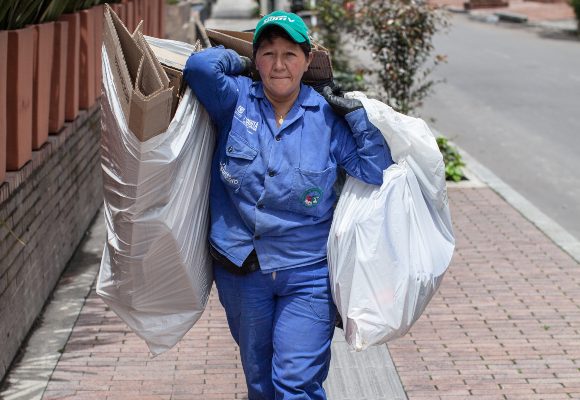
National Waste Picker Organization Challenges New Norms
Until recently, the progress made in Bogotá was a reference for other municipalities in Colombia and an inspiration around the world. Today, however, the system of waste-picker integration and recycling has been weakened and is under threat by these new measures. Waste pickers are losing their income and their access to recyclable materials.
With such a low percentage of material being recycled, it is worrisome that the Government of Colombia announced studies to introduce waste incineration, which could further jeopardize waste pickers’ livelihoods and public health.
Nohra Padilla called on policymakers to see the value of waste pickers in Bogota and across the country. She said, “Follow the Constitutional Order, which is meant to protect all waste pickers."
Nohra Padilla, President of Colombia’s National Associations of Waste Pickers (ANR), recently went on television to raise these issues with local and national policymakers and debate the current situation. She called on policymakers to see the value of waste pickers in Bogota and across the country. She said, “Follow the Constitutional Order, which is meant to protect all waste pickers. The District is supposed to develop a census of waste pickers so that it can establish a positive relationship with the sector. That is not happening in many cities. Waste services organizations can’t become the owners of waste picker’s rights. The right of waste pickers are for waste pickers, which in this country means 60,000 people.”
Beacon of hope from Pereira, Colombia
Waste pickers are still hard at work in cities across Colombia.
At a national level, the waste picker sector is continuing to organize and provide recycling services. New cities are continuing to support waste pickers, despite what is happening in other parts of the country. Just recently, in March 2019, waste pickers in Pereira, Colombia, received remuneration for their services, adding to the nearly 300 waste picker organizations registered across Colombia as service providers (although only 180 of those are active and some problems persist with payments).
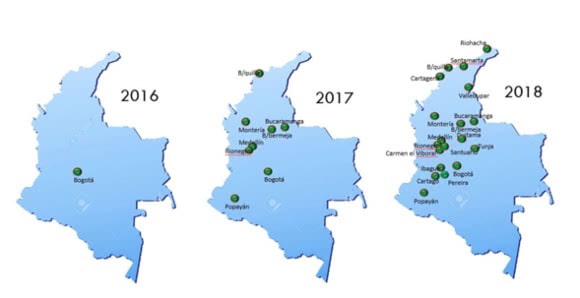
Incorporating waste pickers into municipal systems has made a major impact in Colombia. The annual amount of tons of waste recovered and recycled has increased dramatically — going from 97,905 tons per year in 2016 to 536,092 tons per year in 2017. There is an opportunity now for local and national government to rethink these new policies to recognize waste pickers’ efforts and expertise and show the world how Colombia can be a model for an economically and socially just waste management system once again.
Read more about ANR leader Nohra Padilla and her organization’s fight to improve conditions for Colombia’s waste pickers.
